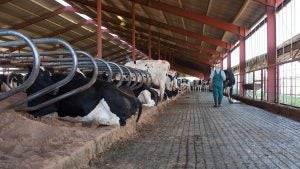It was an opinion that sent shockwaves through farms across the state of Washington. In November 2020, the Washington Supreme Court struck down overtime exemptions for agricultural workers at dairy farms. In a rambling opinion, the court determined that the exemption violated the state constitution because the legislature didn’t have reasonable grounds for creating it. And because workers on dairy farms are subjected to dangerous conditions that are deleterious to their health, the legislature didn’t meet its constitutional burden.
But the truly shocking thing was the court’s comments suggesting its decision should be applied retroactively. Although the issue wasn’t properly in front of the court, and so not directly addressed, the majority’s opinion included a footnote inviting additional lawsuits challenging the decision’s implementation. And, remarkably, the court bluntly noted it would rule in favor of retroactive application.
Unsurprisingly, a number of “echo” suits were filed soon after the court’s decision dropped. Class action lawsuits — organized by activist organizations within and without the state — were filed in various courts around Washington targeting farms in every sector, not just dairy. They all generally seek compensation for the same damages: overtime pay for the last three years of work.

The time frame comes from a sort of “look back” statute of limitations. Actions for wage theft usually allow employees to recover stolen wages from the past three years. And as a way to even the playing field for bad actors, employees are able to recover all of their attorney’s fees incurred in recovering back wages from their employers.
But the family farms now facing exorbitant bills for workers’ past overtime weren’t dodging their obligations. These farms were actually following the law as it existed before the court’s decision. Agricultural workers were exempted from earning overtime pay. So when farmers weren’t paying them overtime, it was lawful.
Now we could have a conversation about whether farm workers should be eligible for overtime wages. Washington farms are second only to Hawaii in paying the highest wages to their employees. Seasonal work is a lot different than a factory shift or a 9-to-5 office job. And it’s possible these workers earn more under the current system. On the other hand, overtime laws may provide employee protections that the exemption doesn’t provide. Or maybe there is a better way to compensate farm workers and offer protections.
But those are questions that a legislature should debate and answer, not a court. And, more importantly, the Washington Supreme Court shouldn’t be punishing farmers for following the law. If the state decides to change the law to include farm employees in the minimum wage statutes, that’s a policy decision. It should apply going forward, not backwards.
I spoke with Dillon Honcoop with Save Family Farming, an organization dedicated to being a voice for Washington agriculture. He likened the situation to a retroactive speed limit. Imagine if you drove down a particular road every day and carefully stayed below the posted 30 mph limit. But one day the court decides the speed limit was wrong; it should’ve been only 25 mph. And since the law has changed, you’re now getting a ticket for every time you drove on the road obeying the previous speed limit. As Dillon pointed out, that’s exactly what’s happening to farm families with the court’s decision.
It’s the fundamental unfairness that has Washington farmers so riled up. Jason Sheehan and his wife operate a dairy and crop farm in eastern Washington. If their employees successfully sue them, the Sheehans could be on the hook for up to $750,000, even though his farm paid some form of overtime to employees since 2015.
“My wife and I are contemplating moving from our farm to another state,” Jason told me. “It is extremely disheartening to have followed the law, and even gone above and beyond, yet still be faced with a lawsuit.”
Ultimately, farm workers will suffer if their employers are forced into bankruptcy over sky-high judgments. And the idea of punishing a family farm — or any business for that matter — for following the law should alarm everyone. The court’s decision could realistically shutter family farms across the state and completely remake the image of Washington agriculture.
Amanda Zaluckyj blogs under the name The Farmer’s Daughter USA. Her goal is to promote farmers and tackle the misinformation swirling around the U.S. food industry.



